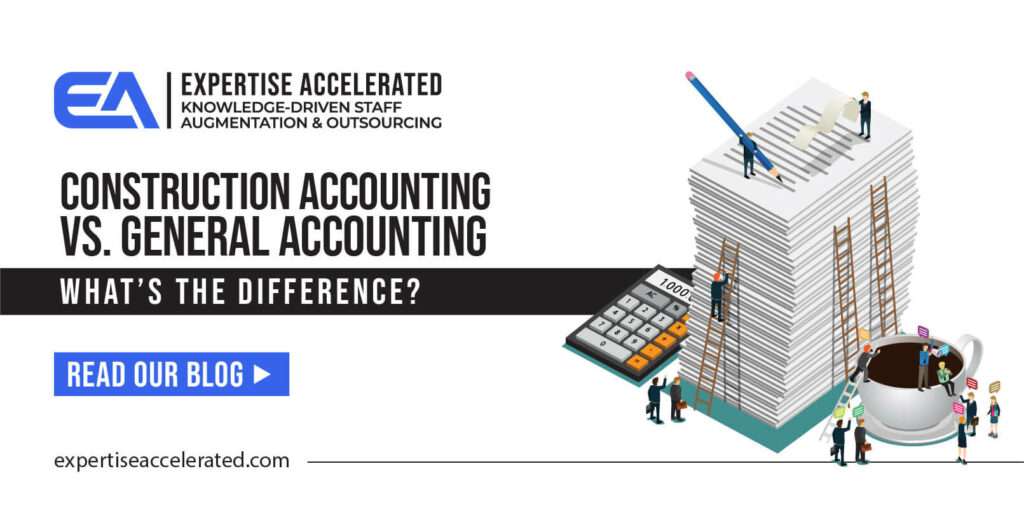Why Construction Accounting is Essential for Efficient Project Management
Why Construction Accounting is Essential for Efficient Project Management
Blog Article
Understanding the Relevance of Construction Accountancy for Successful Project Administration

Role of Building Bookkeeping
Building and construction accounting serves as the foundation of financial administration in the building and construction industry, ensuring that projects are completed within budget plan and financial purposes are met. construction accounting. This specific accountancy strategy addresses the distinct challenges dealt with in building and construction projects, consisting of differing job periods, changing prices, and multiple stakeholders
Among the key functions of building and construction accounting is to provide accurate price estimation and tracking throughout the project lifecycle. This facilitates informed decision-making, enabling project managers to readjust sources and timelines properly. In addition, building bookkeeping improves cash money flow administration by keeping an eye on accounts receivable and payable, therefore making sure that funds are offered for timely repayments to providers and subcontractors.
Moreover, construction bookkeeping aids in conformity with industry regulations and coverage demands. It gears up task supervisors with the needed financial information to prepare comprehensive monetary declarations, which are crucial for audits and monetary reviews. By maintaining clear documents, construction audit cultivates openness and responsibility, vital components in developing count on amongst stakeholders. Eventually, the function of building and construction accountancy extends past simple economic tracking; it is indispensable to calculated planning and functional performance, driving the success of building tasks in an affordable landscape.
Trick Elements of Construction Accounting

Budgeting establishes a financial structure that guides project implementation, permitting managers to allocate sources successfully and expect potential economic difficulties. Accurate expense tracking is important for surveillance costs in real-time, aiding to determine differences between predicted and actual prices. This allows timely adjustments to maintain the task on spending plan.
In addition, monetary reporting supplies stakeholders with a clear photo of the project's monetary health. Normal reports, such as profit and loss declarations and cash flow evaluations, promote informed decision-making and improve openness among all events included.
In addition, compliance with market regulations and audit requirements is critical. This guarantees that economic methods are not just effective however additionally legal, guarding the organization against legal consequences. By integrating these essential parts, building and construction bookkeeping cultivates an organized method to taking care of funds, inevitably contributing to the successful conclusion of construction jobs.
Advantages for Task Managers
Leveraging effective construction bookkeeping techniques gives task supervisors with a plethora of advantages that boost both functional performance and economic oversight. One considerable advantage is improved budget management. Exact monitoring of expenditures and earnings permits job managers to monitor financial efficiency in actual time, making sure jobs stay within spending plan and helping with timely changes when needed.
Furthermore, building accountancy improves cash money circulation management, enabling task supervisors to optimize and prepare for monetary demands source allotment. By understanding money inflows and outflows, they can better handle repayments to employees, vendors, and subcontractors, consequently avoiding expensive hold-ups.
Additionally, robust accounting systems give extensive coverage capacities. Job supervisors can generate records that use insights right into task success, price variances, and resource utilization. This data-driven technique cultivates informed decision-making, enabling supervisors to identify prospective read what he said problems proactively and carry out restorative measures.
Finally, adherence to building and construction accountancy standards guarantees compliance with lawful and regulatory requirements, reducing the danger of disputes or penalties. In general, reliable construction accounting gears up project supervisors with the devices essential to drive task success, boost stakeholder self-confidence, and promote long-term organizational growth.
Usual Difficulties in Building Accountancy
Lots of job managers come across substantial obstacles in building and construction accountancy that can hinder project success. Among the key obstacles is the intricacy of tracking numerous task sites, each with distinct spending plans, timelines, and resource allocations. This calls for thorough interest to detail, which can be overwhelming without a robust audit system in position.
Furthermore, changing material costs and labor prices can complicate budget plan management, making accurate projecting challenging. Project managers usually battle to resolve these costs with actual expenditures, bring about possible financial discrepancies.
In addition, building audit involves conformity with different policies, consisting of tax obligation responsibilities and labor laws. Browsing these guidelines can be complicated, especially for managers that may not have a solid bookkeeping background.
An additional significant obstacle is managing capital, which is crucial in the building and construction market. Hold-ups in invoicing, settlements from clients, or unforeseen task modifications can create cash money flow lacks, threatening the job's progression.
Last but not least, effective communication in between project supervisors, accounting professionals, and field groups is important. Misconceptions can result in incorrect economic reporting, better complicating job monitoring efforts. Attending to these difficulties proactively is crucial for successful building and construction More Info audit.

Finest Practices for Effective Audit
While browsing the intricacies of building and construction audit can be complicated, adopting ideal techniques can dramatically boost monetary administration and job success. One fundamental practice is keeping exact and prompt documents. Implementing robust accountancy software program tailored to building and construction projects can simplify information entry, invoicing, and coverage, saving and reducing mistakes time.
Furthermore, establishing a clear budget and regular surveillance against this budget are essential. Employing a system of routine monetary reviews allows task managers to recognize variations early, helping with timely decision-making. It is additionally necessary to separate task expenses into straight and indirect classifications, enabling more clear understandings right into earnings.
Another finest practice entails promoting open interaction amongst all stakeholders. Routine updates and collaborative conversations about monetary standing can make sure everyone is lined up and educated. Training staff in construction-specific accounting principles better enhances proficiency and accuracy.
Finally, ensuring compliance with pertinent accounting criteria and policies is non-negotiable. Normal audits and inner reviews add to transparency and accountability, developing trust fund with stakeholders and clients. By focusing on these finest techniques, construction companies can maximize their accounting procedures, eventually driving job success and financial security.
Verdict
Finally, building and construction accounting plays an essential duty in guaranteeing effective task management by promoting exact financial oversight and enhancing decision-making. By integrating key elements such as expense estimate, capital administration, and conformity, task supervisors can browse usual challenges and take advantage of finest methods for effective bookkeeping. Eventually, a durable construction audit investigate this site structure not just safeguards spending plan honesty yet additionally adds to the general monetary health and wellness of building projects, fostering sustainable success within the industry.
By integrating these key parts, building bookkeeping promotes a structured approach to taking care of monetary sources, eventually contributing to the effective completion of construction projects.
Exact tracking of expenses and earnings allows task supervisors to keep an eye on financial performance in actual time, making certain jobs remain within budget plan and facilitating prompt modifications when necessary.
Task supervisors can produce records that use insights right into job profitability, price variations, and source use.Lots of project supervisors encounter considerable challenges in building and construction accountancy that can hinder job success. construction accounting. Inevitably, a robust building and construction accounting structure not just safeguards spending plan stability but likewise adds to the overall economic health and wellness of construction jobs, cultivating sustainable success within the market
Report this page